Ethical Dilemmas at Work
VerifiedAdded on 2022/12/29
|8
|2545
|46
AI Summary
This report discusses the concept of ethical dilemmas at work, the different types of employment, and the rules and regulations in employment law. It also explores the concept of constructive dismissal and provides advice for handling ethical dilemmas in the workplace.
Contribute Materials
Your contribution can guide someone’s learning journey. Share your
documents today.
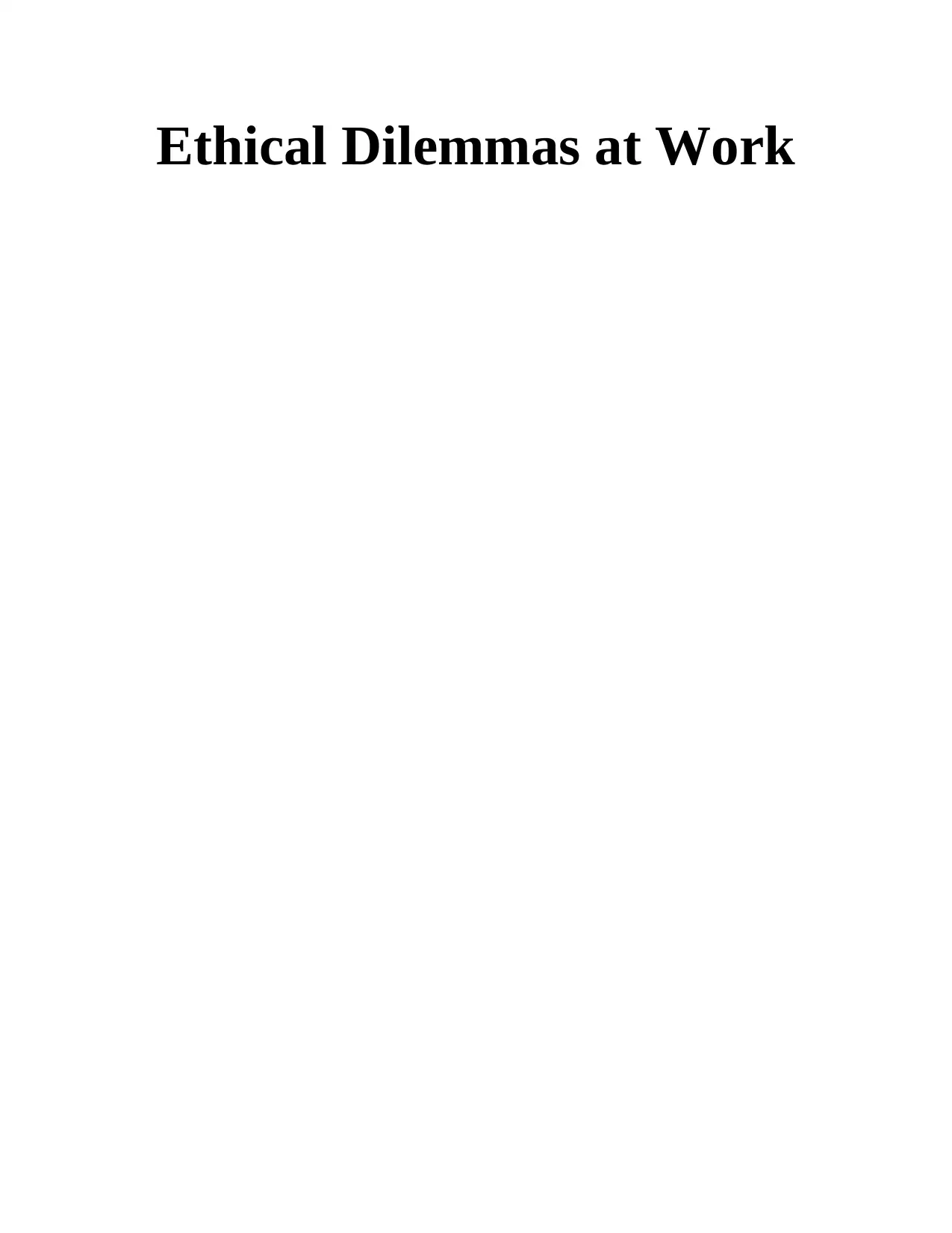
Ethical Dilemmas at Work
Secure Best Marks with AI Grader
Need help grading? Try our AI Grader for instant feedback on your assignments.
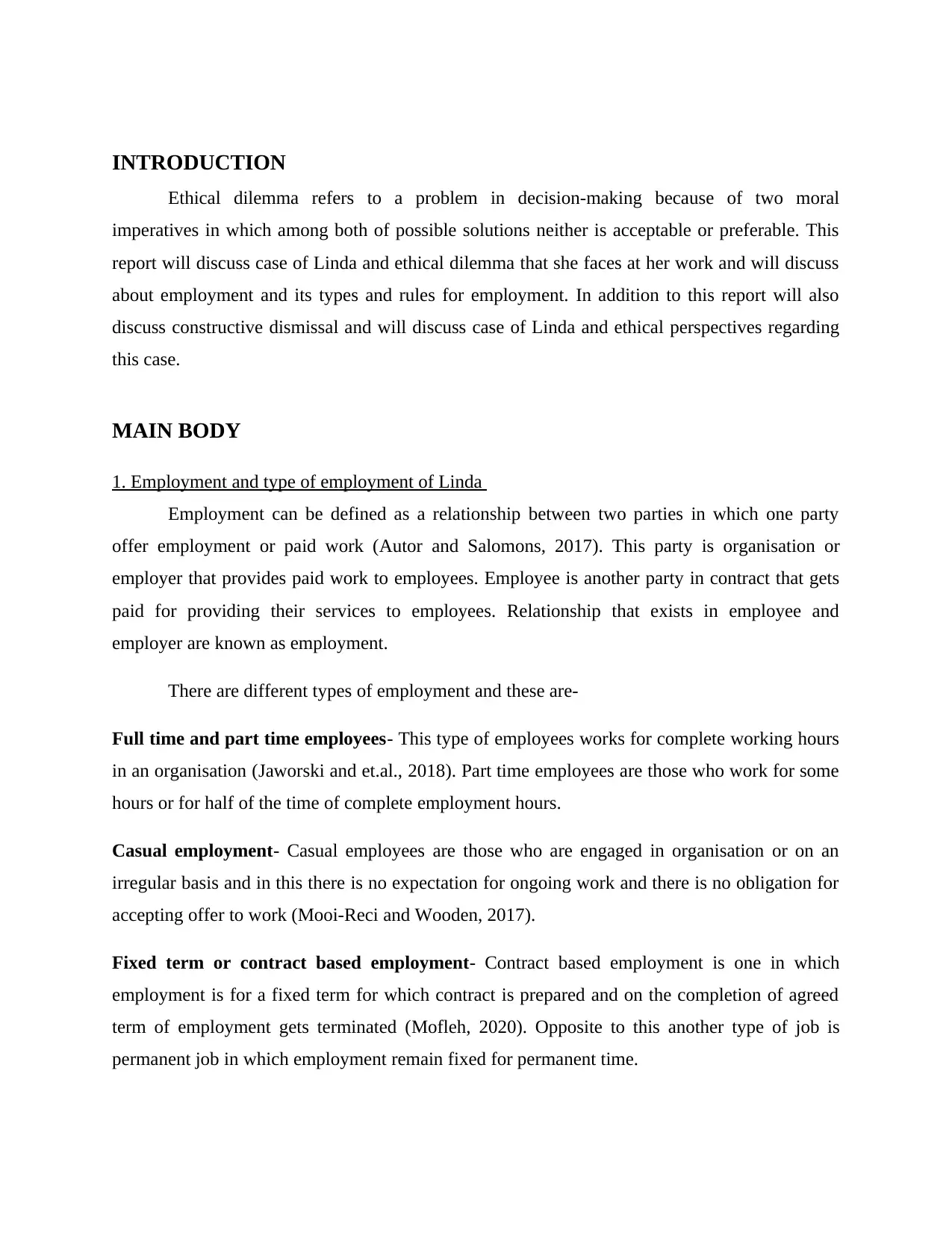
INTRODUCTION
Ethical dilemma refers to a problem in decision-making because of two moral
imperatives in which among both of possible solutions neither is acceptable or preferable. This
report will discuss case of Linda and ethical dilemma that she faces at her work and will discuss
about employment and its types and rules for employment. In addition to this report will also
discuss constructive dismissal and will discuss case of Linda and ethical perspectives regarding
this case.
MAIN BODY
1. Employment and type of employment of Linda
Employment can be defined as a relationship between two parties in which one party
offer employment or paid work (Autor and Salomons, 2017). This party is organisation or
employer that provides paid work to employees. Employee is another party in contract that gets
paid for providing their services to employees. Relationship that exists in employee and
employer are known as employment.
There are different types of employment and these are-
Full time and part time employees- This type of employees works for complete working hours
in an organisation (Jaworski and et.al., 2018). Part time employees are those who work for some
hours or for half of the time of complete employment hours.
Casual employment- Casual employees are those who are engaged in organisation or on an
irregular basis and in this there is no expectation for ongoing work and there is no obligation for
accepting offer to work (Mooi-Reci and Wooden, 2017).
Fixed term or contract based employment- Contract based employment is one in which
employment is for a fixed term for which contract is prepared and on the completion of agreed
term of employment gets terminated (Mofleh, 2020). Opposite to this another type of job is
permanent job in which employment remain fixed for permanent time.
Ethical dilemma refers to a problem in decision-making because of two moral
imperatives in which among both of possible solutions neither is acceptable or preferable. This
report will discuss case of Linda and ethical dilemma that she faces at her work and will discuss
about employment and its types and rules for employment. In addition to this report will also
discuss constructive dismissal and will discuss case of Linda and ethical perspectives regarding
this case.
MAIN BODY
1. Employment and type of employment of Linda
Employment can be defined as a relationship between two parties in which one party
offer employment or paid work (Autor and Salomons, 2017). This party is organisation or
employer that provides paid work to employees. Employee is another party in contract that gets
paid for providing their services to employees. Relationship that exists in employee and
employer are known as employment.
There are different types of employment and these are-
Full time and part time employees- This type of employees works for complete working hours
in an organisation (Jaworski and et.al., 2018). Part time employees are those who work for some
hours or for half of the time of complete employment hours.
Casual employment- Casual employees are those who are engaged in organisation or on an
irregular basis and in this there is no expectation for ongoing work and there is no obligation for
accepting offer to work (Mooi-Reci and Wooden, 2017).
Fixed term or contract based employment- Contract based employment is one in which
employment is for a fixed term for which contract is prepared and on the completion of agreed
term of employment gets terminated (Mofleh, 2020). Opposite to this another type of job is
permanent job in which employment remain fixed for permanent time.
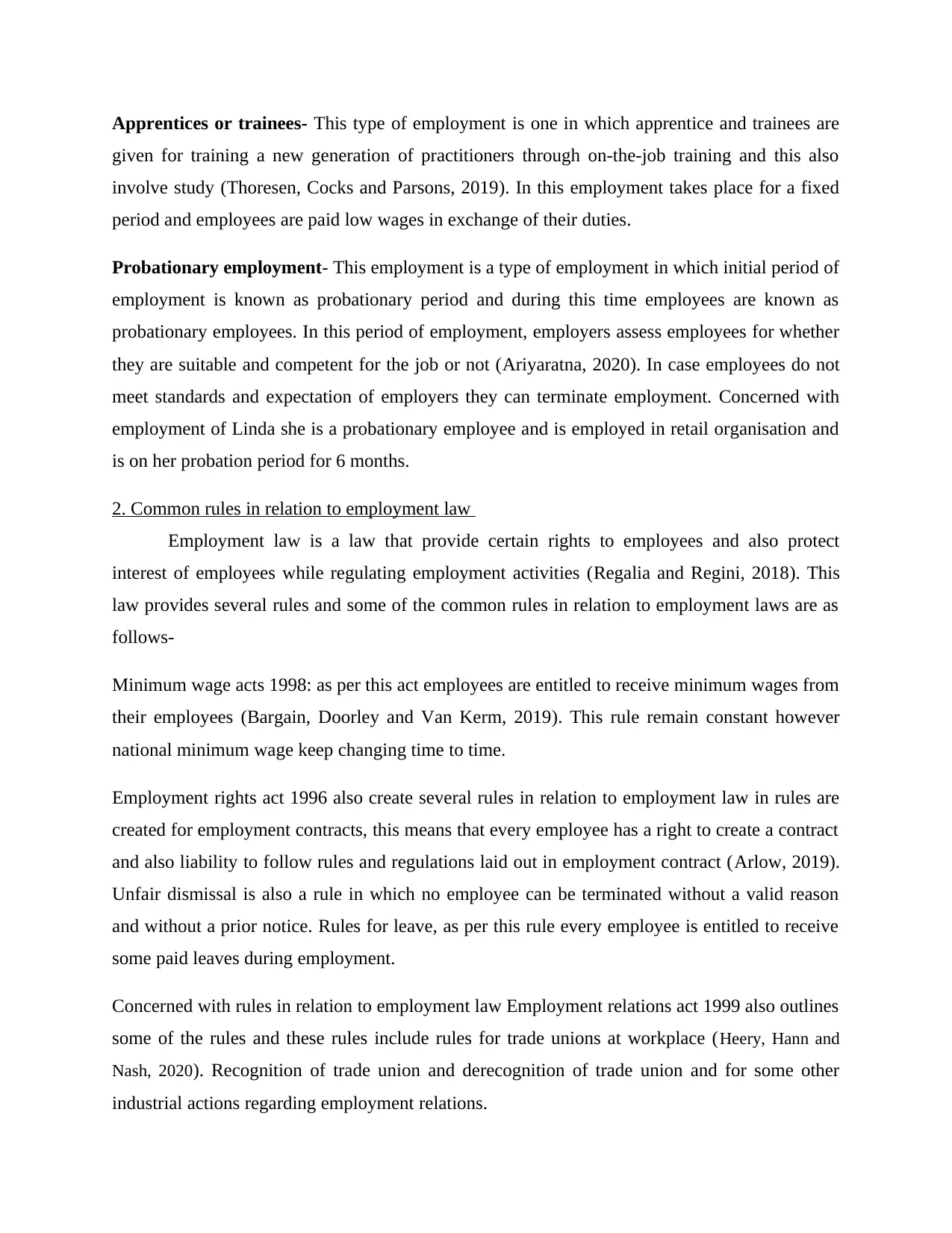
Apprentices or trainees- This type of employment is one in which apprentice and trainees are
given for training a new generation of practitioners through on-the-job training and this also
involve study (Thoresen, Cocks and Parsons, 2019). In this employment takes place for a fixed
period and employees are paid low wages in exchange of their duties.
Probationary employment- This employment is a type of employment in which initial period of
employment is known as probationary period and during this time employees are known as
probationary employees. In this period of employment, employers assess employees for whether
they are suitable and competent for the job or not (Ariyaratna, 2020). In case employees do not
meet standards and expectation of employers they can terminate employment. Concerned with
employment of Linda she is a probationary employee and is employed in retail organisation and
is on her probation period for 6 months.
2. Common rules in relation to employment law
Employment law is a law that provide certain rights to employees and also protect
interest of employees while regulating employment activities (Regalia and Regini, 2018). This
law provides several rules and some of the common rules in relation to employment laws are as
follows-
Minimum wage acts 1998: as per this act employees are entitled to receive minimum wages from
their employees (Bargain, Doorley and Van Kerm, 2019). This rule remain constant however
national minimum wage keep changing time to time.
Employment rights act 1996 also create several rules in relation to employment law in rules are
created for employment contracts, this means that every employee has a right to create a contract
and also liability to follow rules and regulations laid out in employment contract (Arlow, 2019).
Unfair dismissal is also a rule in which no employee can be terminated without a valid reason
and without a prior notice. Rules for leave, as per this rule every employee is entitled to receive
some paid leaves during employment.
Concerned with rules in relation to employment law Employment relations act 1999 also outlines
some of the rules and these rules include rules for trade unions at workplace (Heery, Hann and
Nash, 2020). Recognition of trade union and derecognition of trade union and for some other
industrial actions regarding employment relations.
given for training a new generation of practitioners through on-the-job training and this also
involve study (Thoresen, Cocks and Parsons, 2019). In this employment takes place for a fixed
period and employees are paid low wages in exchange of their duties.
Probationary employment- This employment is a type of employment in which initial period of
employment is known as probationary period and during this time employees are known as
probationary employees. In this period of employment, employers assess employees for whether
they are suitable and competent for the job or not (Ariyaratna, 2020). In case employees do not
meet standards and expectation of employers they can terminate employment. Concerned with
employment of Linda she is a probationary employee and is employed in retail organisation and
is on her probation period for 6 months.
2. Common rules in relation to employment law
Employment law is a law that provide certain rights to employees and also protect
interest of employees while regulating employment activities (Regalia and Regini, 2018). This
law provides several rules and some of the common rules in relation to employment laws are as
follows-
Minimum wage acts 1998: as per this act employees are entitled to receive minimum wages from
their employees (Bargain, Doorley and Van Kerm, 2019). This rule remain constant however
national minimum wage keep changing time to time.
Employment rights act 1996 also create several rules in relation to employment law in rules are
created for employment contracts, this means that every employee has a right to create a contract
and also liability to follow rules and regulations laid out in employment contract (Arlow, 2019).
Unfair dismissal is also a rule in which no employee can be terminated without a valid reason
and without a prior notice. Rules for leave, as per this rule every employee is entitled to receive
some paid leaves during employment.
Concerned with rules in relation to employment law Employment relations act 1999 also outlines
some of the rules and these rules include rules for trade unions at workplace (Heery, Hann and
Nash, 2020). Recognition of trade union and derecognition of trade union and for some other
industrial actions regarding employment relations.
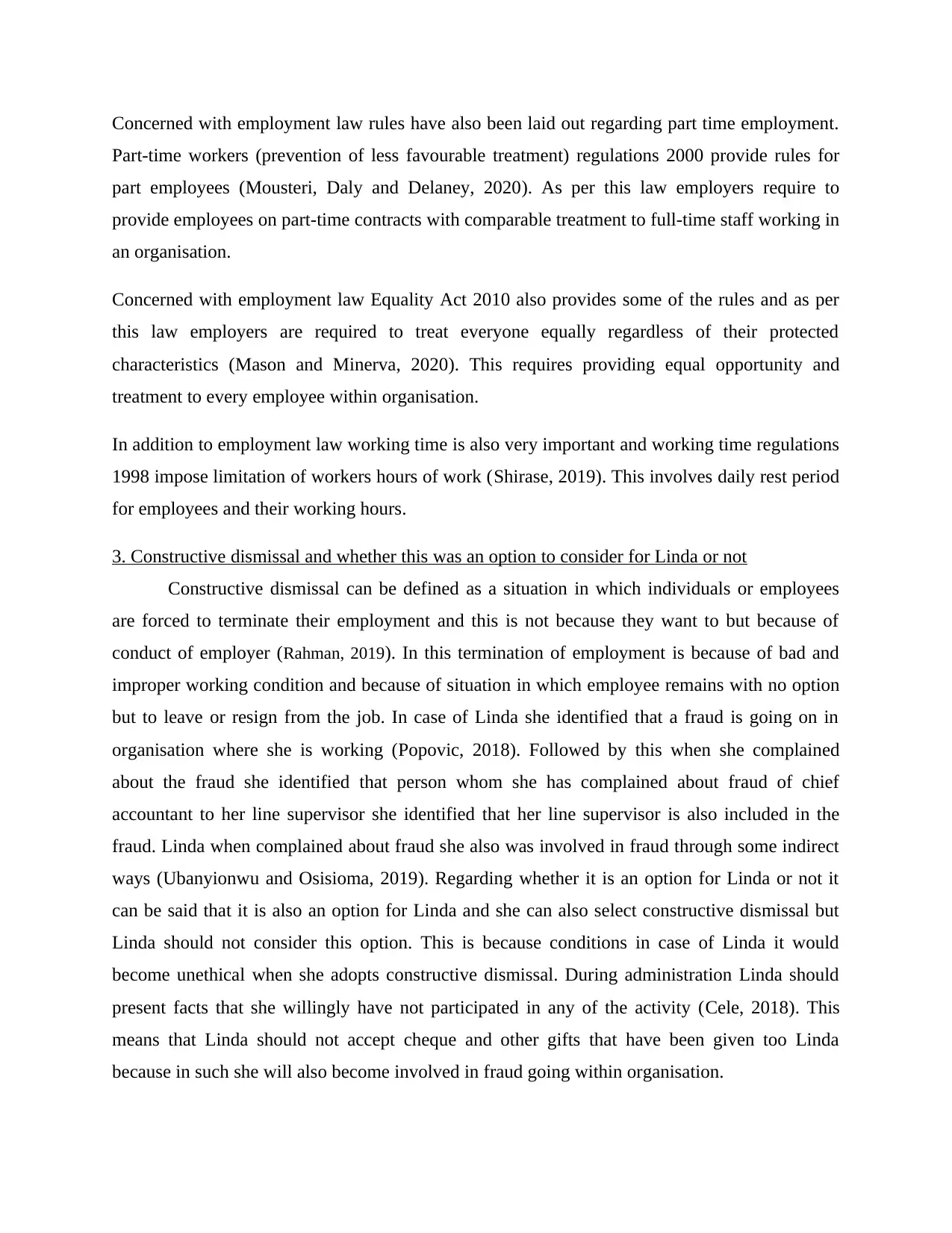
Concerned with employment law rules have also been laid out regarding part time employment.
Part-time workers (prevention of less favourable treatment) regulations 2000 provide rules for
part employees (Mousteri, Daly and Delaney, 2020). As per this law employers require to
provide employees on part-time contracts with comparable treatment to full-time staff working in
an organisation.
Concerned with employment law Equality Act 2010 also provides some of the rules and as per
this law employers are required to treat everyone equally regardless of their protected
characteristics (Mason and Minerva, 2020). This requires providing equal opportunity and
treatment to every employee within organisation.
In addition to employment law working time is also very important and working time regulations
1998 impose limitation of workers hours of work (Shirase, 2019). This involves daily rest period
for employees and their working hours.
3. Constructive dismissal and whether this was an option to consider for Linda or not
Constructive dismissal can be defined as a situation in which individuals or employees
are forced to terminate their employment and this is not because they want to but because of
conduct of employer (Rahman, 2019). In this termination of employment is because of bad and
improper working condition and because of situation in which employee remains with no option
but to leave or resign from the job. In case of Linda she identified that a fraud is going on in
organisation where she is working (Popovic, 2018). Followed by this when she complained
about the fraud she identified that person whom she has complained about fraud of chief
accountant to her line supervisor she identified that her line supervisor is also included in the
fraud. Linda when complained about fraud she also was involved in fraud through some indirect
ways (Ubanyionwu and Osisioma, 2019). Regarding whether it is an option for Linda or not it
can be said that it is also an option for Linda and she can also select constructive dismissal but
Linda should not consider this option. This is because conditions in case of Linda it would
become unethical when she adopts constructive dismissal. During administration Linda should
present facts that she willingly have not participated in any of the activity (Cele, 2018). This
means that Linda should not accept cheque and other gifts that have been given too Linda
because in such she will also become involved in fraud going within organisation.
Part-time workers (prevention of less favourable treatment) regulations 2000 provide rules for
part employees (Mousteri, Daly and Delaney, 2020). As per this law employers require to
provide employees on part-time contracts with comparable treatment to full-time staff working in
an organisation.
Concerned with employment law Equality Act 2010 also provides some of the rules and as per
this law employers are required to treat everyone equally regardless of their protected
characteristics (Mason and Minerva, 2020). This requires providing equal opportunity and
treatment to every employee within organisation.
In addition to employment law working time is also very important and working time regulations
1998 impose limitation of workers hours of work (Shirase, 2019). This involves daily rest period
for employees and their working hours.
3. Constructive dismissal and whether this was an option to consider for Linda or not
Constructive dismissal can be defined as a situation in which individuals or employees
are forced to terminate their employment and this is not because they want to but because of
conduct of employer (Rahman, 2019). In this termination of employment is because of bad and
improper working condition and because of situation in which employee remains with no option
but to leave or resign from the job. In case of Linda she identified that a fraud is going on in
organisation where she is working (Popovic, 2018). Followed by this when she complained
about the fraud she identified that person whom she has complained about fraud of chief
accountant to her line supervisor she identified that her line supervisor is also included in the
fraud. Linda when complained about fraud she also was involved in fraud through some indirect
ways (Ubanyionwu and Osisioma, 2019). Regarding whether it is an option for Linda or not it
can be said that it is also an option for Linda and she can also select constructive dismissal but
Linda should not consider this option. This is because conditions in case of Linda it would
become unethical when she adopts constructive dismissal. During administration Linda should
present facts that she willingly have not participated in any of the activity (Cele, 2018). This
means that Linda should not accept cheque and other gifts that have been given too Linda
because in such she will also become involved in fraud going within organisation.
Secure Best Marks with AI Grader
Need help grading? Try our AI Grader for instant feedback on your assignments.
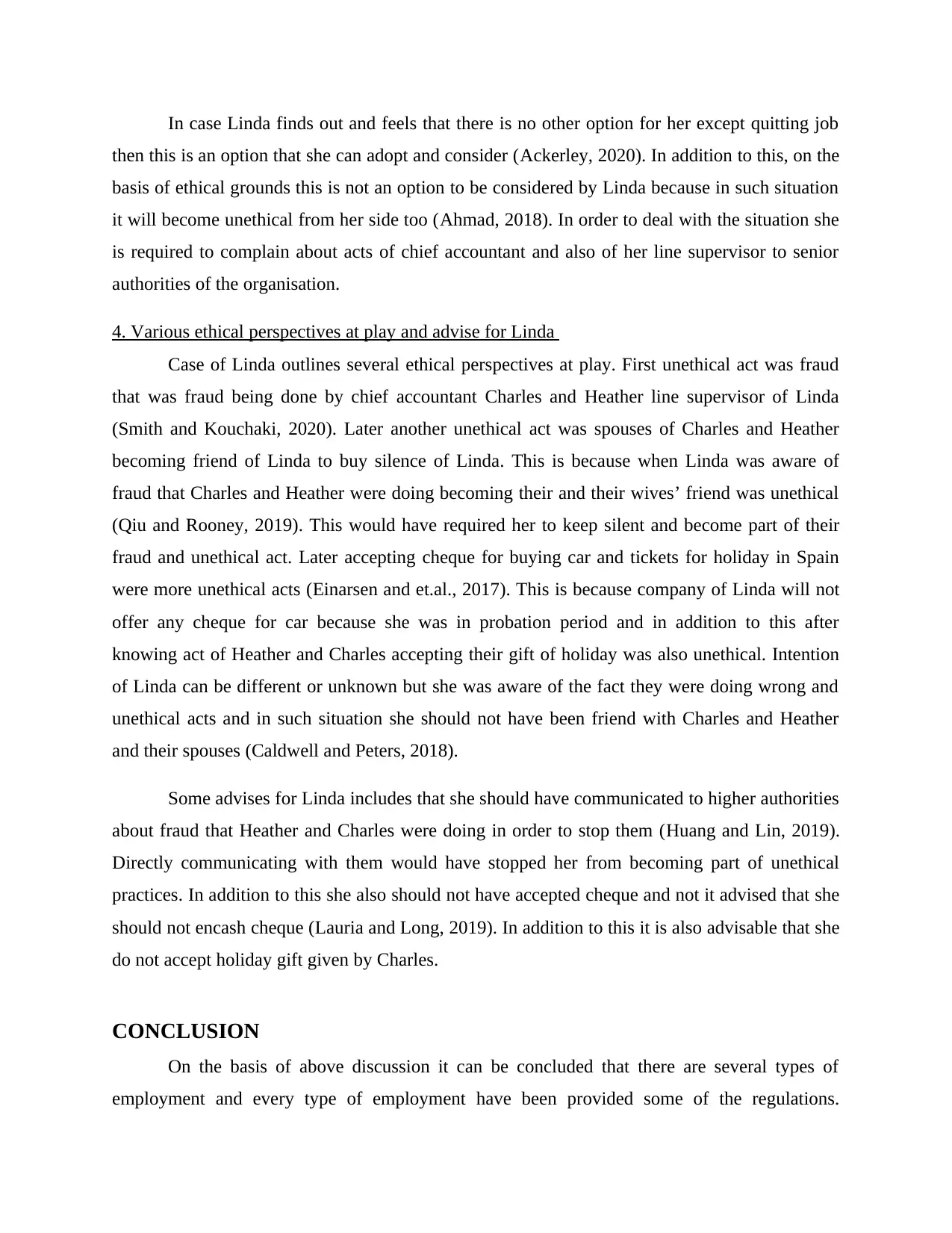
In case Linda finds out and feels that there is no other option for her except quitting job
then this is an option that she can adopt and consider (Ackerley, 2020). In addition to this, on the
basis of ethical grounds this is not an option to be considered by Linda because in such situation
it will become unethical from her side too (Ahmad, 2018). In order to deal with the situation she
is required to complain about acts of chief accountant and also of her line supervisor to senior
authorities of the organisation.
4. Various ethical perspectives at play and advise for Linda
Case of Linda outlines several ethical perspectives at play. First unethical act was fraud
that was fraud being done by chief accountant Charles and Heather line supervisor of Linda
(Smith and Kouchaki, 2020). Later another unethical act was spouses of Charles and Heather
becoming friend of Linda to buy silence of Linda. This is because when Linda was aware of
fraud that Charles and Heather were doing becoming their and their wives’ friend was unethical
(Qiu and Rooney, 2019). This would have required her to keep silent and become part of their
fraud and unethical act. Later accepting cheque for buying car and tickets for holiday in Spain
were more unethical acts (Einarsen and et.al., 2017). This is because company of Linda will not
offer any cheque for car because she was in probation period and in addition to this after
knowing act of Heather and Charles accepting their gift of holiday was also unethical. Intention
of Linda can be different or unknown but she was aware of the fact they were doing wrong and
unethical acts and in such situation she should not have been friend with Charles and Heather
and their spouses (Caldwell and Peters, 2018).
Some advises for Linda includes that she should have communicated to higher authorities
about fraud that Heather and Charles were doing in order to stop them (Huang and Lin, 2019).
Directly communicating with them would have stopped her from becoming part of unethical
practices. In addition to this she also should not have accepted cheque and not it advised that she
should not encash cheque (Lauria and Long, 2019). In addition to this it is also advisable that she
do not accept holiday gift given by Charles.
CONCLUSION
On the basis of above discussion it can be concluded that there are several types of
employment and every type of employment have been provided some of the regulations.
then this is an option that she can adopt and consider (Ackerley, 2020). In addition to this, on the
basis of ethical grounds this is not an option to be considered by Linda because in such situation
it will become unethical from her side too (Ahmad, 2018). In order to deal with the situation she
is required to complain about acts of chief accountant and also of her line supervisor to senior
authorities of the organisation.
4. Various ethical perspectives at play and advise for Linda
Case of Linda outlines several ethical perspectives at play. First unethical act was fraud
that was fraud being done by chief accountant Charles and Heather line supervisor of Linda
(Smith and Kouchaki, 2020). Later another unethical act was spouses of Charles and Heather
becoming friend of Linda to buy silence of Linda. This is because when Linda was aware of
fraud that Charles and Heather were doing becoming their and their wives’ friend was unethical
(Qiu and Rooney, 2019). This would have required her to keep silent and become part of their
fraud and unethical act. Later accepting cheque for buying car and tickets for holiday in Spain
were more unethical acts (Einarsen and et.al., 2017). This is because company of Linda will not
offer any cheque for car because she was in probation period and in addition to this after
knowing act of Heather and Charles accepting their gift of holiday was also unethical. Intention
of Linda can be different or unknown but she was aware of the fact they were doing wrong and
unethical acts and in such situation she should not have been friend with Charles and Heather
and their spouses (Caldwell and Peters, 2018).
Some advises for Linda includes that she should have communicated to higher authorities
about fraud that Heather and Charles were doing in order to stop them (Huang and Lin, 2019).
Directly communicating with them would have stopped her from becoming part of unethical
practices. In addition to this she also should not have accepted cheque and not it advised that she
should not encash cheque (Lauria and Long, 2019). In addition to this it is also advisable that she
do not accept holiday gift given by Charles.
CONCLUSION
On the basis of above discussion it can be concluded that there are several types of
employment and every type of employment have been provided some of the regulations.
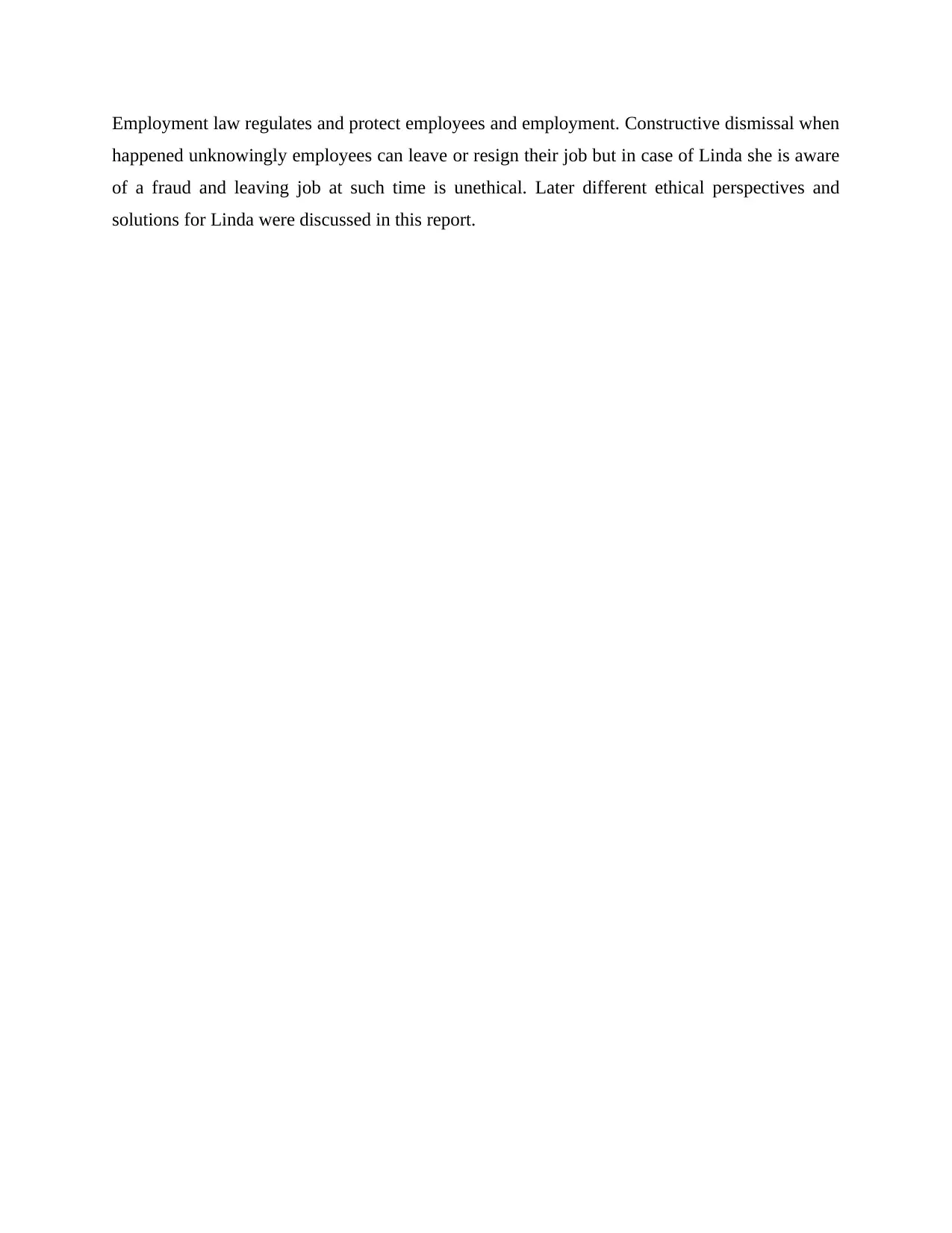
Employment law regulates and protect employees and employment. Constructive dismissal when
happened unknowingly employees can leave or resign their job but in case of Linda she is aware
of a fraud and leaving job at such time is unethical. Later different ethical perspectives and
solutions for Linda were discussed in this report.
happened unknowingly employees can leave or resign their job but in case of Linda she is aware
of a fraud and leaving job at such time is unethical. Later different ethical perspectives and
solutions for Linda were discussed in this report.
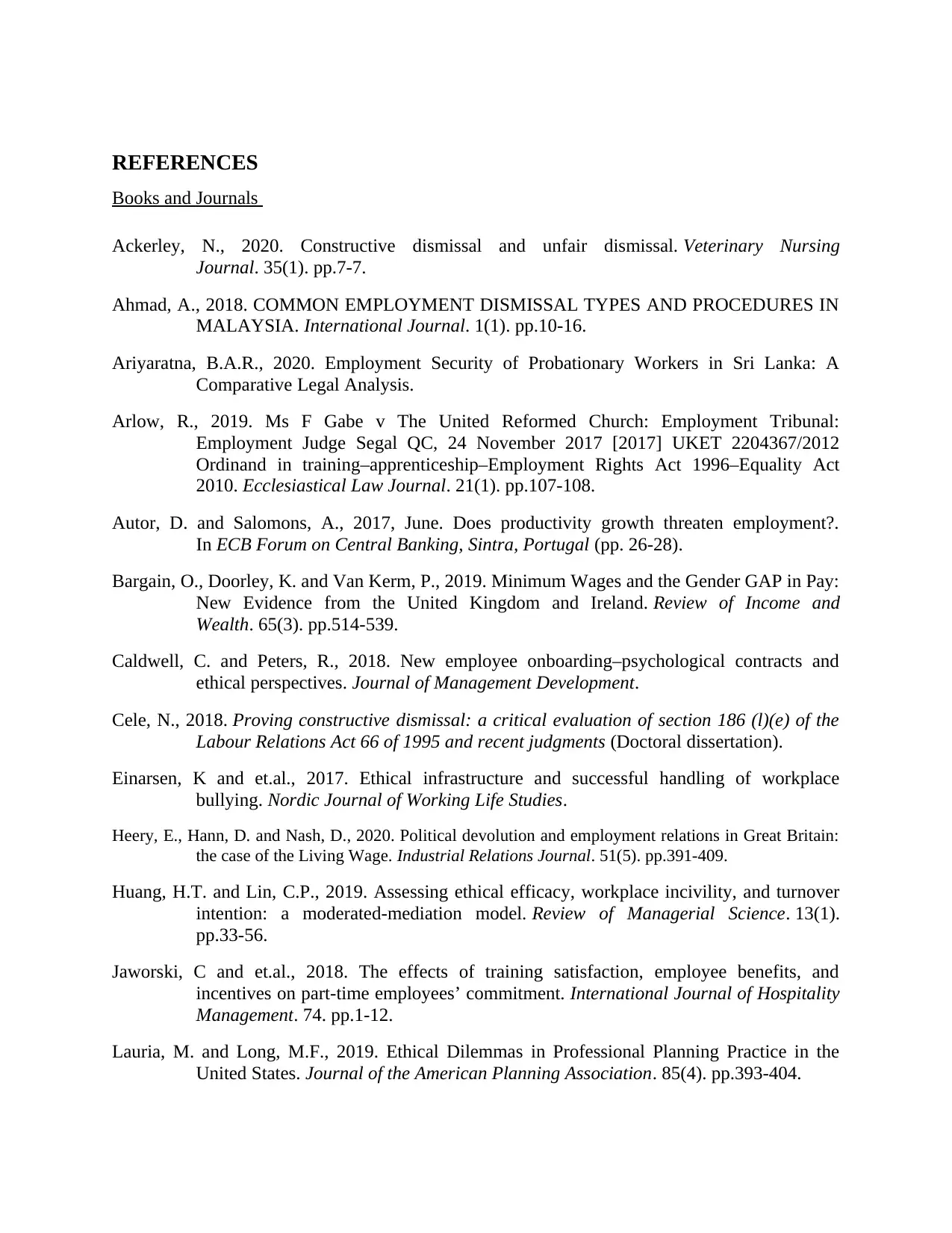
REFERENCES
Books and Journals
Ackerley, N., 2020. Constructive dismissal and unfair dismissal. Veterinary Nursing
Journal. 35(1). pp.7-7.
Ahmad, A., 2018. COMMON EMPLOYMENT DISMISSAL TYPES AND PROCEDURES IN
MALAYSIA. International Journal. 1(1). pp.10-16.
Ariyaratna, B.A.R., 2020. Employment Security of Probationary Workers in Sri Lanka: A
Comparative Legal Analysis.
Arlow, R., 2019. Ms F Gabe v The United Reformed Church: Employment Tribunal:
Employment Judge Segal QC, 24 November 2017 [2017] UKET 2204367/2012
Ordinand in training–apprenticeship–Employment Rights Act 1996–Equality Act
2010. Ecclesiastical Law Journal. 21(1). pp.107-108.
Autor, D. and Salomons, A., 2017, June. Does productivity growth threaten employment?.
In ECB Forum on Central Banking, Sintra, Portugal (pp. 26-28).
Bargain, O., Doorley, K. and Van Kerm, P., 2019. Minimum Wages and the Gender GAP in Pay:
New Evidence from the United Kingdom and Ireland. Review of Income and
Wealth. 65(3). pp.514-539.
Caldwell, C. and Peters, R., 2018. New employee onboarding–psychological contracts and
ethical perspectives. Journal of Management Development.
Cele, N., 2018. Proving constructive dismissal: a critical evaluation of section 186 (l)(e) of the
Labour Relations Act 66 of 1995 and recent judgments (Doctoral dissertation).
Einarsen, K and et.al., 2017. Ethical infrastructure and successful handling of workplace
bullying. Nordic Journal of Working Life Studies.
Heery, E., Hann, D. and Nash, D., 2020. Political devolution and employment relations in Great Britain:
the case of the Living Wage. Industrial Relations Journal. 51(5). pp.391-409.
Huang, H.T. and Lin, C.P., 2019. Assessing ethical efficacy, workplace incivility, and turnover
intention: a moderated-mediation model. Review of Managerial Science. 13(1).
pp.33-56.
Jaworski, C and et.al., 2018. The effects of training satisfaction, employee benefits, and
incentives on part-time employees’ commitment. International Journal of Hospitality
Management. 74. pp.1-12.
Lauria, M. and Long, M.F., 2019. Ethical Dilemmas in Professional Planning Practice in the
United States. Journal of the American Planning Association. 85(4). pp.393-404.
Books and Journals
Ackerley, N., 2020. Constructive dismissal and unfair dismissal. Veterinary Nursing
Journal. 35(1). pp.7-7.
Ahmad, A., 2018. COMMON EMPLOYMENT DISMISSAL TYPES AND PROCEDURES IN
MALAYSIA. International Journal. 1(1). pp.10-16.
Ariyaratna, B.A.R., 2020. Employment Security of Probationary Workers in Sri Lanka: A
Comparative Legal Analysis.
Arlow, R., 2019. Ms F Gabe v The United Reformed Church: Employment Tribunal:
Employment Judge Segal QC, 24 November 2017 [2017] UKET 2204367/2012
Ordinand in training–apprenticeship–Employment Rights Act 1996–Equality Act
2010. Ecclesiastical Law Journal. 21(1). pp.107-108.
Autor, D. and Salomons, A., 2017, June. Does productivity growth threaten employment?.
In ECB Forum on Central Banking, Sintra, Portugal (pp. 26-28).
Bargain, O., Doorley, K. and Van Kerm, P., 2019. Minimum Wages and the Gender GAP in Pay:
New Evidence from the United Kingdom and Ireland. Review of Income and
Wealth. 65(3). pp.514-539.
Caldwell, C. and Peters, R., 2018. New employee onboarding–psychological contracts and
ethical perspectives. Journal of Management Development.
Cele, N., 2018. Proving constructive dismissal: a critical evaluation of section 186 (l)(e) of the
Labour Relations Act 66 of 1995 and recent judgments (Doctoral dissertation).
Einarsen, K and et.al., 2017. Ethical infrastructure and successful handling of workplace
bullying. Nordic Journal of Working Life Studies.
Heery, E., Hann, D. and Nash, D., 2020. Political devolution and employment relations in Great Britain:
the case of the Living Wage. Industrial Relations Journal. 51(5). pp.391-409.
Huang, H.T. and Lin, C.P., 2019. Assessing ethical efficacy, workplace incivility, and turnover
intention: a moderated-mediation model. Review of Managerial Science. 13(1).
pp.33-56.
Jaworski, C and et.al., 2018. The effects of training satisfaction, employee benefits, and
incentives on part-time employees’ commitment. International Journal of Hospitality
Management. 74. pp.1-12.
Lauria, M. and Long, M.F., 2019. Ethical Dilemmas in Professional Planning Practice in the
United States. Journal of the American Planning Association. 85(4). pp.393-404.
Paraphrase This Document
Need a fresh take? Get an instant paraphrase of this document with our AI Paraphraser
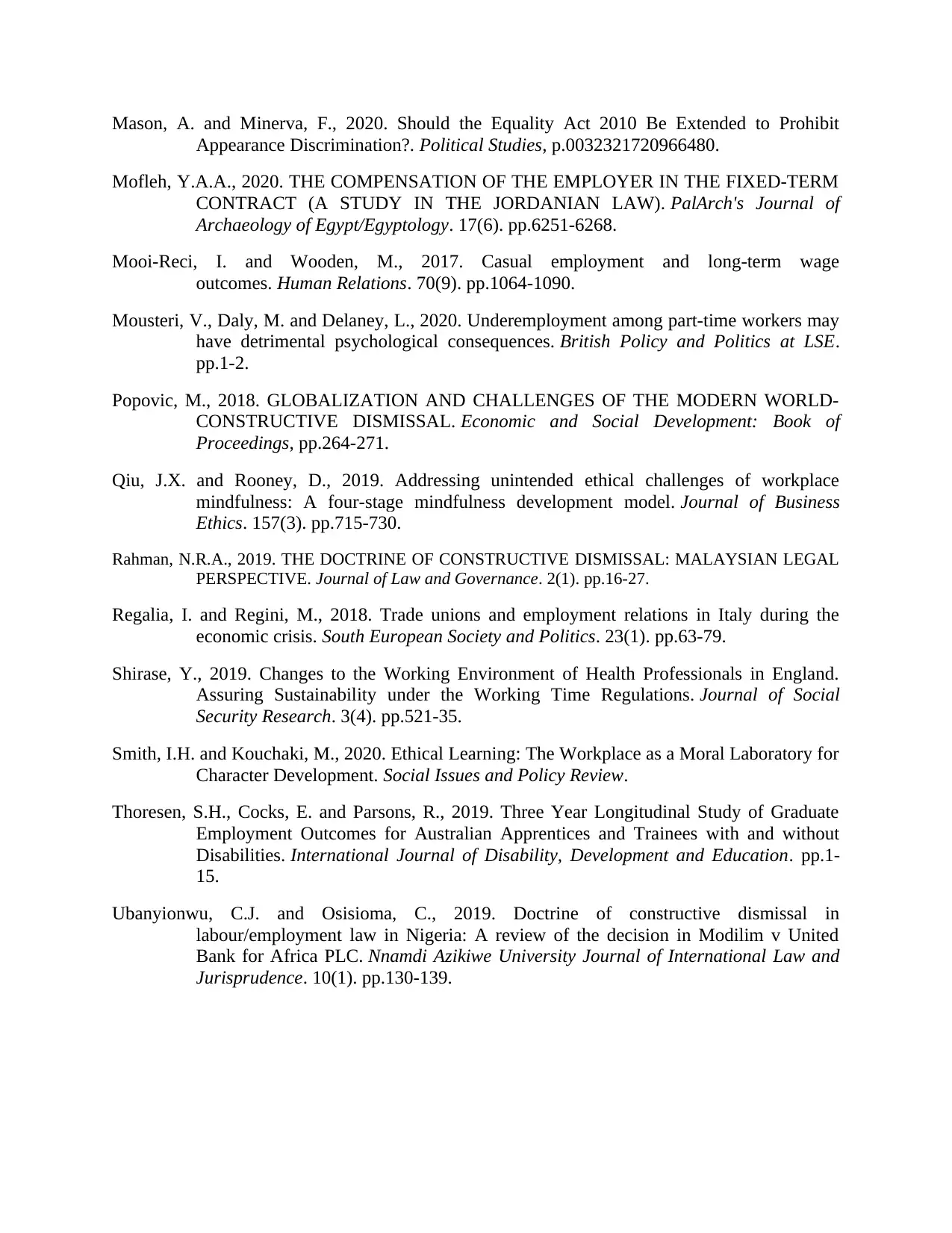
Mason, A. and Minerva, F., 2020. Should the Equality Act 2010 Be Extended to Prohibit
Appearance Discrimination?. Political Studies, p.0032321720966480.
Mofleh, Y.A.A., 2020. THE COMPENSATION OF THE EMPLOYER IN THE FIXED-TERM
CONTRACT (A STUDY IN THE JORDANIAN LAW). PalArch's Journal of
Archaeology of Egypt/Egyptology. 17(6). pp.6251-6268.
Mooi-Reci, I. and Wooden, M., 2017. Casual employment and long-term wage
outcomes. Human Relations. 70(9). pp.1064-1090.
Mousteri, V., Daly, M. and Delaney, L., 2020. Underemployment among part-time workers may
have detrimental psychological consequences. British Policy and Politics at LSE.
pp.1-2.
Popovic, M., 2018. GLOBALIZATION AND CHALLENGES OF THE MODERN WORLD-
CONSTRUCTIVE DISMISSAL. Economic and Social Development: Book of
Proceedings, pp.264-271.
Qiu, J.X. and Rooney, D., 2019. Addressing unintended ethical challenges of workplace
mindfulness: A four-stage mindfulness development model. Journal of Business
Ethics. 157(3). pp.715-730.
Rahman, N.R.A., 2019. THE DOCTRINE OF CONSTRUCTIVE DISMISSAL: MALAYSIAN LEGAL
PERSPECTIVE. Journal of Law and Governance. 2(1). pp.16-27.
Regalia, I. and Regini, M., 2018. Trade unions and employment relations in Italy during the
economic crisis. South European Society and Politics. 23(1). pp.63-79.
Shirase, Y., 2019. Changes to the Working Environment of Health Professionals in England.
Assuring Sustainability under the Working Time Regulations. Journal of Social
Security Research. 3(4). pp.521-35.
Smith, I.H. and Kouchaki, M., 2020. Ethical Learning: The Workplace as a Moral Laboratory for
Character Development. Social Issues and Policy Review.
Thoresen, S.H., Cocks, E. and Parsons, R., 2019. Three Year Longitudinal Study of Graduate
Employment Outcomes for Australian Apprentices and Trainees with and without
Disabilities. International Journal of Disability, Development and Education. pp.1-
15.
Ubanyionwu, C.J. and Osisioma, C., 2019. Doctrine of constructive dismissal in
labour/employment law in Nigeria: A review of the decision in Modilim v United
Bank for Africa PLC. Nnamdi Azikiwe University Journal of International Law and
Jurisprudence. 10(1). pp.130-139.
Appearance Discrimination?. Political Studies, p.0032321720966480.
Mofleh, Y.A.A., 2020. THE COMPENSATION OF THE EMPLOYER IN THE FIXED-TERM
CONTRACT (A STUDY IN THE JORDANIAN LAW). PalArch's Journal of
Archaeology of Egypt/Egyptology. 17(6). pp.6251-6268.
Mooi-Reci, I. and Wooden, M., 2017. Casual employment and long-term wage
outcomes. Human Relations. 70(9). pp.1064-1090.
Mousteri, V., Daly, M. and Delaney, L., 2020. Underemployment among part-time workers may
have detrimental psychological consequences. British Policy and Politics at LSE.
pp.1-2.
Popovic, M., 2018. GLOBALIZATION AND CHALLENGES OF THE MODERN WORLD-
CONSTRUCTIVE DISMISSAL. Economic and Social Development: Book of
Proceedings, pp.264-271.
Qiu, J.X. and Rooney, D., 2019. Addressing unintended ethical challenges of workplace
mindfulness: A four-stage mindfulness development model. Journal of Business
Ethics. 157(3). pp.715-730.
Rahman, N.R.A., 2019. THE DOCTRINE OF CONSTRUCTIVE DISMISSAL: MALAYSIAN LEGAL
PERSPECTIVE. Journal of Law and Governance. 2(1). pp.16-27.
Regalia, I. and Regini, M., 2018. Trade unions and employment relations in Italy during the
economic crisis. South European Society and Politics. 23(1). pp.63-79.
Shirase, Y., 2019. Changes to the Working Environment of Health Professionals in England.
Assuring Sustainability under the Working Time Regulations. Journal of Social
Security Research. 3(4). pp.521-35.
Smith, I.H. and Kouchaki, M., 2020. Ethical Learning: The Workplace as a Moral Laboratory for
Character Development. Social Issues and Policy Review.
Thoresen, S.H., Cocks, E. and Parsons, R., 2019. Three Year Longitudinal Study of Graduate
Employment Outcomes for Australian Apprentices and Trainees with and without
Disabilities. International Journal of Disability, Development and Education. pp.1-
15.
Ubanyionwu, C.J. and Osisioma, C., 2019. Doctrine of constructive dismissal in
labour/employment law in Nigeria: A review of the decision in Modilim v United
Bank for Africa PLC. Nnamdi Azikiwe University Journal of International Law and
Jurisprudence. 10(1). pp.130-139.
1 out of 8
Related Documents
Your All-in-One AI-Powered Toolkit for Academic Success.
+13062052269
info@desklib.com
Available 24*7 on WhatsApp / Email
![[object Object]](/_next/static/media/star-bottom.7253800d.svg)
Unlock your academic potential
© 2024 | Zucol Services PVT LTD | All rights reserved.





